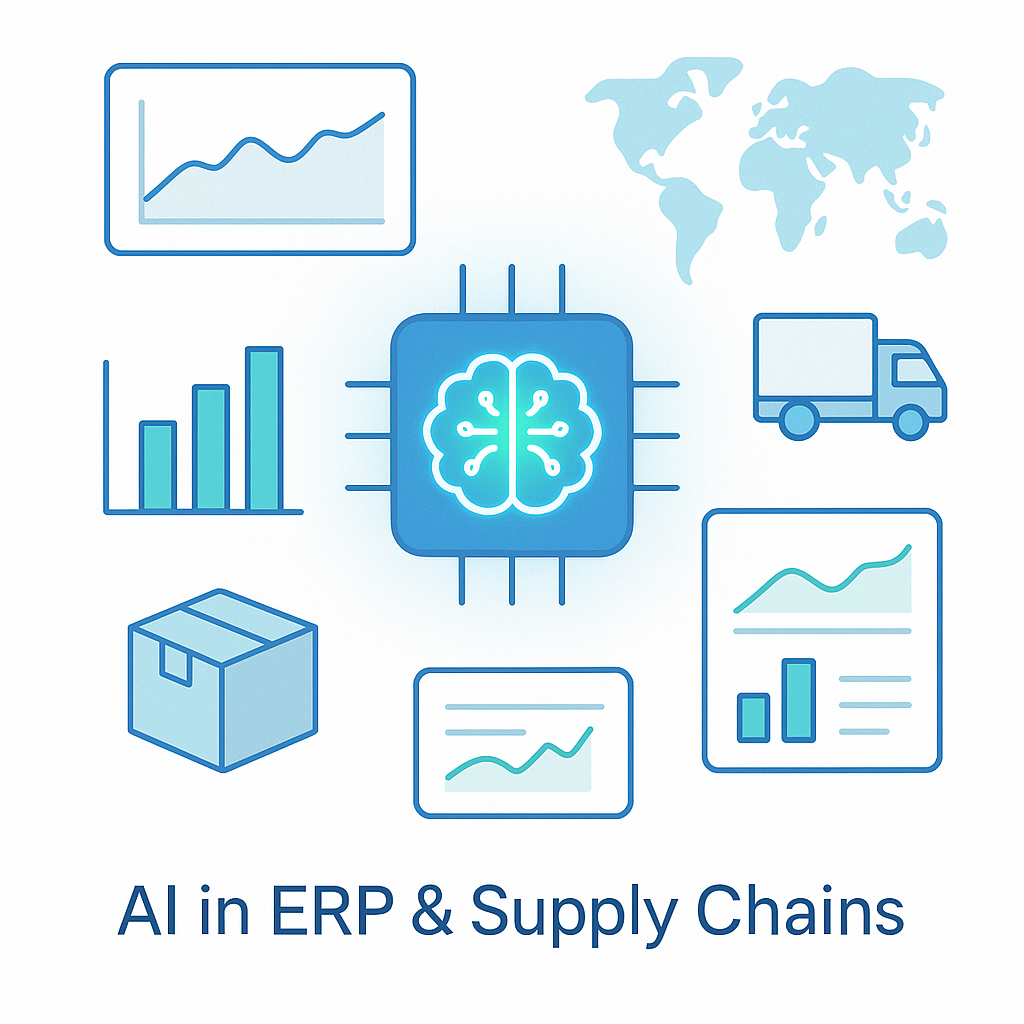June 23, 2025
•By Anix AI Team
•AI in ERP
How AI Enhances Decision-Making in ERP and Supply Chain Systems

In today’s competitive market, businesses rely heavily on Enterprise Resource Planning (ERP) and supply chain systems to run smoothly. These systems manage everything from inventory to customer orders and financial planning. But the real challenge lies in making timely and accurate decisions based on the vast data they generate. That’s where Artificial Intelligence (AI) steps in. AI enhances decision-making by offering real-time insights, pattern recognition, and predictive capabilities. In ERP and supply chain systems, it is becoming a game-changer for smarter operations and strategic growth.
What is ERP and Supply Chain Management?
ERP is a software system that integrates core business processes such as accounting, procurement, project management, and manufacturing. Supply chain management deals with the flow of goods and services from suppliers to customers.
Both systems collect huge amounts of data daily. However, without intelligent analysis, this data is often underutilized. AI helps convert this data into actionable insights, enabling faster and smarter decisions.
Real-Time Data Analysis
One of the biggest strengths of AI is its ability to process data in real time. Traditional systems often work with static reports, which means decisions are based on past data.
With AI, ERP and supply chain systems can continuously analyze new data as it comes in. For example, if a factory machine slows down, the system can detect it instantly and suggest maintenance. Or if inventory is running low, AI can automatically trigger a re-order based on predictive demand.
This real-time capability makes operations more agile and responsive.
Demand Forecasting and Inventory Management
AI enhances forecasting accuracy by analyzing historical data, market trends, seasonality, and even external factors like weather or economic indicators.
In supply chains, accurate forecasting ensures that stock levels are optimized. Businesses can avoid both understocking and overstocking, reducing waste and improving customer satisfaction.
In ERP systems, this means better planning of materials, workforce, and financial resources. Companies can confidently make production decisions knowing that demand estimates are reliable.
Predictive Maintenance and Downtime Reduction
In manufacturing and logistics, machine downtime can be very costly. AI-powered ERP systems monitor equipment health and predict failures before they happen.
Sensors and IoT devices collect real-time machine data, which AI uses to detect unusual patterns. It can alert managers about potential breakdowns or schedule preventive maintenance.
This predictive approach avoids unexpected disruptions and keeps operations running smoothly.
Intelligent Procurement and Vendor Management
AI also improves procurement decisions by evaluating vendor performance, pricing trends, and delivery timelines. It can recommend the best suppliers based on cost-efficiency and reliability.
AI systems can even conduct automated negotiations or suggest contract terms that align with company goals. This leads to smarter buying decisions and better supplier relationships.
Risk Management and Compliance
Both ERP and supply chain systems face several risks—market volatility, supplier issues, regulatory changes, and more. AI helps identify and manage these risks by continuously scanning for threats and evaluating impact.
For instance, if a key supplier is in a politically unstable region, AI can assess the risk and suggest alternatives. It also ensures that business operations comply with laws and internal policies through automated checks.
This proactive approach helps companies avoid losses and penalties.
Better Customer Service and Order Fulfillment
AI in ERP and supply chains enhances the customer experience by ensuring timely order fulfillment, accurate delivery tracking, and faster issue resolution.
It analyzes customer behavior to predict preferences, personalize offerings, and plan better delivery routes. This leads to improved satisfaction and loyalty.
AI-powered chatbots and virtual assistants also help customers with real-time support related to orders, returns, or complaints.
Decision Dashboards and Recommendations
Modern AI tools provide intelligent dashboards that display key metrics in real-time. But more importantly, they go one step further by recommending actions.
Instead of just showing low inventory levels, AI may suggest the optimal time and quantity for the next order. Or if sales are dropping in a region, it can point out the possible reasons and recommend corrective steps.
This turns ERP and supply chain systems into decision-support engines rather than just data storage platforms.
Final Thoughts
Artificial Intelligence is adding a smart layer to ERP and supply chain systems. From improving forecasts and reducing downtime to managing risks and delighting customers, AI is reshaping how decisions are made.
Businesses that embrace AI in their operations are not only improving efficiency but also gaining a competitive edge. As technology advances, AI will become even more integral to strategic decision-making, making systems more autonomous, intelligent, and effective.
The future of enterprise success lies in combining human intelligence with AI-powered tools for faster, more confident business decisions.